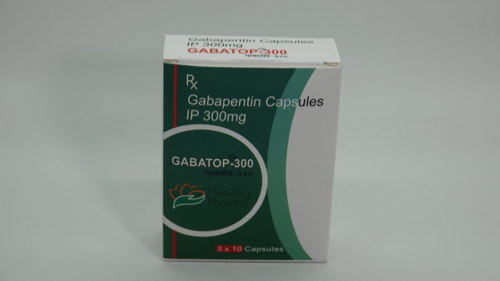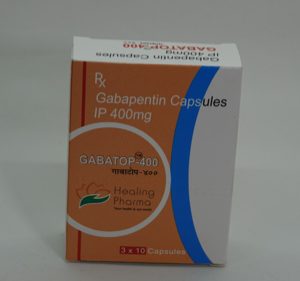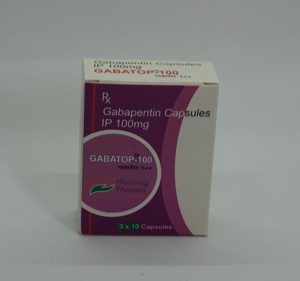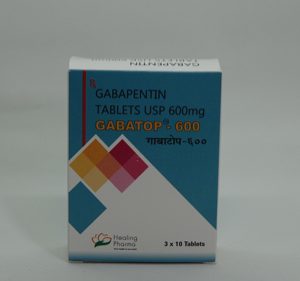Gabapentin (Gabatop 300) 300 mg Tablets is a structural analogue of the inhibitory neurotransmitter gamma-aminobutyric acid (GABA) used on its own or together with other medicines to treat several types of epilepsy (fits or seizures).
Gabapentin may also be used to treat peripheral neuropathic pain and other conditions as decided by your doctor.
Drug = Gabapentin
Strength = 300 mg
Manufacturer = Healing Pharma
Quantity per sleeve = 30 Capsules (for the price quoted)
How To Take Gabapentin (Gabatop 300) 300 mg Tablets
This medicine may be taken with or without food. Try to take it at the same time each day.
Gabapentin is available as a conventional or extended-release tablet, a capsule or an oral solution.
If you are given the conventional tablet, you may swallow it whole with a glass of water. If necessary, you may divide the conventional tablet into two equal half-tablets along the break line. Half-tablets should be taken soon after dividing the tablet.
If you are given the extended-release tablet or the capsule, swallow it whole with a glass of water without dividing, chewing or crushing it.
Do not switch between different brands or dosage forms unless advised by your doctor.
This medicine must be taken regularly for it to be effective. Continue to take it even when you feel better. Take Gabapentin exactly as directed by your doctor or according to the instructions on the label. Do not take more or less than instructed by your doctor.
Dosage of Gabapentin (Gabatop 300) 300 mg Tablets
Epilepsy: Initial: 300 mg once daily on the 1st day, 300 mg twice a day on the 2nd day, and 300 mg three times a day on the 3rd day. Alternatively, 300 mg three times a day on the 1st day. Doses may be further increased in 300 mg/day increments every 2-3 days according to individual response and tolerability. Effective dosing range: 900-3,600 mg daily. Total daily dose must be given in 3 equally divided doses, at maximum dose interval not exceeding 12 hours.
Neuropathic pain: Initial: 300 mg once daily on the 1st day, 300 mg twice a day on the 2nd day and 300 mg three times a day on the 3rd day. Alternatively, 900 mg daily in 3 equally divided doses as the starting dose. Doses may be further increased in 300 mg/day increments every 2-3 days according to individual response and tolerability. Maximum: 3,600 mg/day.
Restless leg syndrome: As gabapentin enacarbil: Modified-release preparation: Moderate to severe: 600 mg once daily at approximately 5 pm.
Postherpetic neuralgia: As gabapentin enacarbil: Modified-release preparation: Initial: 600 mg once daily in the morning for 3 days, then increased to 600 mg twice a day.
Missed Dose of Gabapentin (Gabatop 300) 300 mg Tablets
If you often forget to take your medicine, let your doctor and pharmacist know.
Take the missed dose as soon as you remember. If it is almost time for your next dose, skip the missed dose and return to your usual dosing schedule.
Do not double a dose under any circumstances.
Overdose
Signs of overdose may include the following:
- Dizziness
- Drowsiness
- Double vision
- Slurred speech
- Mild diarrhea
- Lethargy
- Loss of consciousness
Seek medical help immediately.
Contraindications of Gabapentin (Gabatop 300) 300 mg Tablets
There are no known contraindications for Gabapentin.
Side Effects of Gabapentin (Gabatop 300) 300 mg Tablets
Gabapentin may have the following side effects:
- Suicidal ideation and behavior
- Emotional lability
- Hostility
- Changes in behavior and thinking
- Hyperkinesia
- Acute pancreatitis
- Respiratory depression
- Anaphylaxis
- Angioedema
- Leucopenia
- Thrombocytopenia
- Vertigo
- Tinnitus
- Nystagmus
- Amblyopia
- Diplopia
- Nausea
- Vomiting
- Diarrhea
- Dry mouth
- Dental abnormality
- Dyspepsia
- Gingivitis
- Flatulence
- Constipation
- Fatigue
- Fever
- Peripheral edema
- Abnormal gait
- Asthenia
- Malaise
- Viral infection
- Pneumonia
- Otitis media
- Accidental injury
- Fracture
- Weight gain
- Decreased white blood cells
- Anorexia
- Increased appetite
- Back pain
- Arthralgia
- Myalgia
- Somnolence
- Dizziness
- Headache
- Ataxia
- Amnesia
- Tremor
- Confusion
- Depression
- Nervousness
- Anxiety
- Impotence
- Dyspnea
- Bronchitis
- Cough
- Rhinitis
- Rash
- Pruritus
- Acne
- Hypertension
- Vasodilatation
Potentially Fatal:
- Multiorgan hypersensitivity
- Drug reaction with eosinophilia systemic symptoms (DRESS)
Warnings of Gabapentin (Gabatop 300) 300 mg Tablets
Do not use in people with the following conditions:
- History of drug abuse history of mental illness
- Kidney disease or undergoing dialysis
- Children
- Elderly
- Pregnancy
- Lactation
Inform your doctor and pharmacist if you are taking the following medicines:
- Morphine
- Hydrocodone
- Antacids
Always notify your doctor and pharmacist if you are taking any other medicines, including herbal tonics such as traditional Chinese medicines, supplements and medicines that you buy without a prescription.
This list does not include all medicines that may interact with Gabapentin.
How Does It Work?
Gabapentin works by binding with high affinity to the α-2-δ-1 subunit of voltage-gated calcium channels, thereby modulating the release of excitatory neurotransmitters which participate in epileptogenesis and nociception.
Uses
Gabapentin is used to treat the following conditions:
- Epilepsy
- Neuropathic pain
- Restless leg syndrome
- Postherpetic neuralgia
Special Precautions and Connected Warnings
Take special precautions if you have the following conditions:
- Patients with mixed seizures including absences
- Compromised respiratory function
- Respiratory or neurological disease
- History of substance abuse
- Concomitant use with opioids
- Avoid abrupt withdrawal
- Renal impairment
- Children
- Elderly
- Pregnancy
- Lactation
- Avoid alcohol
Storage Conditions
- Conventional tab and cap: Store below 25°C. Extended-release tab: Store at 25°C. Protect from moisture.
- If you are given the conventional or extended-release tablet or a capsule, store it in a cool, dry place away from the reach of children.
- Do not use Gabapentin that is expired or out of expiry date.




